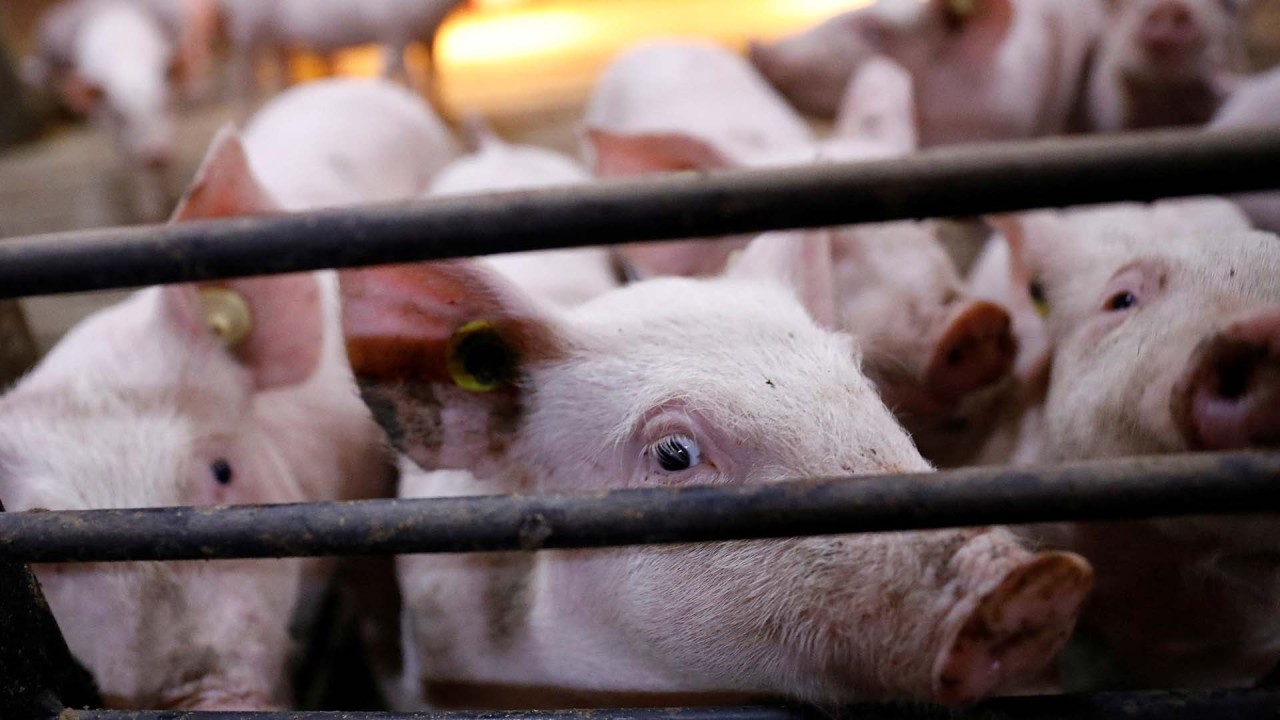
Promising results as Chinese vaccine trial sees African swine fever fatality rate fall to zero
- While African swine fever has a high mortality rate, in testing the Chinese-developed vaccine candidate, there were no fatalities
- The virus outbreak has devastated the global pork industry in recent years, with 1.5 million animals lost since January 2021
“It has resulted in economic losses of hundreds of billions of yuan for the swine industry, affecting the livelihoods of many people and industry development,” he told the Post on Tuesday.
Vaccines generally work by stimulating the immune system, including antibodies, to defend against a particular virus or bacteria. To achieve this, vaccines show the body a harmless version of the pathogen, or part of it so that it can remember it.
For this vaccine candidate, Weng’s team designed a live but weakened version of the virus to trigger a strong immune reaction.
To do this, the scientists deleted two highly pathogenic genes previously identified in the African swine fever virus to create a new mutant.
This was then administered to two groups of five pigs – grouped as low-dose and high-dose. All the animals developed detectable antibodies.
After 28 days, the pigs were then given the virus.
The results showed that all vaccinated pigs survived the illness. A few animals in the low-dose group exhibited mild, brief clinical symptoms with the virus detectable in their blood, but no significant tissue lesions were found.
Meanwhile a control group of pigs which were not given the vaccine died within 10 to 12 days of contracting the virus.
The vaccine research was conducted by a group of scientists from Harbin Veterinary Research Institute, under the Chinese Academy of Agricultural Sciences, with the findings published last month in the peer-reviewed Journal of Virology.
While African swine fever is not dangerous to humans, the current global outbreak has led to the loss of 1.5 million animals through the virus and culling since January 2021, with Europe the hardest hit region, according to the latest statistics from the World Organisation for Animal Health (WOAH) released in September.
100 pigs at Hong Kong farm culled over 32 cases of African swine fever
During that time, 974,335 domestic pigs and 29,301 wild boars were confirmed to be infected with the virus.
“This spread confirms the global threat of the disease and highlights the importance of implementing biosecurity measures, an early reporting and response system, and maintaining a high level of disease awareness among all actors involved in the value chain,” WOAH said.
Since 2018, the Chinese government has launched many scientific initiatives to tackle the disease, from a basic understanding of the virus to vaccine development.
Weng and his colleagues started their research at the end of 2018.
“We began from ‘zero’,” he said, but over the last five years, his team has achieved many world-leading breakthroughs.

African swine fever was first identified in 1921 in Kenya. In the past three decades, finding a safe and effective vaccine has been a global effort – but it has so far proved elusive.
An example of that global bid to develop a vaccine can be seen in the work being done by scientists at the Agriculture Research Service of the US Department of Agriculture (USDA).
Their approach involves deleting a specific gene, and in April 2022, the USDA announced the successful completion of a key safety test required for regulatory approval.
“We addressed some unclear issues in basic research by extensively screening more than 180 genes of this virus,” Weng said, noting that his team has identified a crucial structural protein, one of the two pathogenic genes mentioned earlier.
The knowledge equates to a big leap in the field. It allows the vaccinated pigs to avoid infecting other animals they come into contact with, and prevents more pigs from being culled.
Vietnam partners with US to develop first African swine fever vaccine
Weng also said that the vaccine candidate did not show any adverse reactions, such as prolonged fever, after being administered. It is also a simple immunisation protocol, requiring just a single dose.
But, Weng said, there is still a long way to go before the vaccine becomes commercially viable, with technical, regulatory and financial hurdles to jump.
USDA microbiologist Douglas Gladue declined to comment on the experimental vaccine from the Chinese team, telling the Post: “A lot more data or studies are needed to bring a vaccine to market.”
And in July, to prevent the spread of the disease, China’s General Administration of Customs and the Ministry of Agriculture and Rural Affairs announced a prohibition on the direct or indirect import of pigs, wild boars and their products from Croatia.


